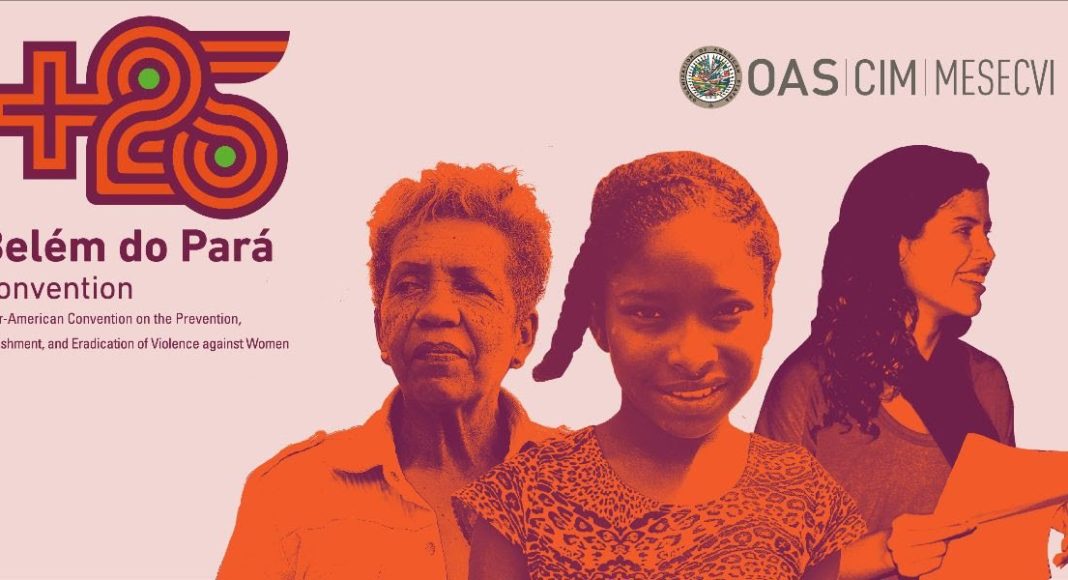The Inter-American Convention on the Prevention, Punishment, and Eradication of Violence against Women was passed in 1994 in Belém do Pará, Brazil by the OAS (Organisation of American States/Organización de Estados Americanos. It constitutes the first international human rights treaty addressing violence against women and has been endorsed by 32 of the 34 signatory states. Its principal aim is to guarantee the right of women to live their lives free of violence, both in the public and private spheres and it seeks to do this by promoting the punishment of acts of violence and giving reparations to victims, as well as aiming to prevent violence by changing sexist stereotypes through education and training.
The Belém do Pará Convention asserts that the historically unequal power relations between men and women are at the root of Violence Against Women (VAW) going on to state that VAW is a violation of human rights, and its eradication represents the only path to achieving equality. Fundamental to the Convention is the understanding that women can experience gender-based violence in any social context and at the hands of any individual. Thus, signatory states are obliged to protect women from gender-based violence 1)Among others, this includes factors such as age, ethnicity, gender or sexual orientation, being pregnant, a refugee, migrant or displaced person, socio-economically deprived, deprived of their liberty, or trafficked. regardless of where it occurs, or the personal characteristics of the perpetrator.
VAW is defined as: “any act or conduct, based on gender, which causes death or physical, sexual or psychological harm or suffering to women, whether in the public or the private sphere”, furthermore, it may include violence “a. that occurs within the family or domestic unit or within any other interpersonal relationship; b. that occurs in the community and is perpetrated by any person; and c. that is perpetrated or condoned by the state or its agents regardless of where it occurs”. And that it may be either physical, psychological, or sexual in nature.
The Convention establishes that governments have the following obligations: to apply due diligence to prevent and punish violence against women; to refrain from engaging in any act of VAW; to institute appropriate civil and penal legislation; to establish fair and effective legal procedures so that women have access to emergency protective measures and restitution; and to modify practices in their own institutions that tolerate VAW, among other measures (article 7).
Additionally, governments are also obliged to modify the sexist stereotypes at the heart of gender-based violence by implementing public policies encompassing all arms of the state and civil society. These might include education programmes; training for public sector employees; large-scale awareness-raising campaigns; coordination with communications media; effective and specialist help for women who have experienced violence and their families – including the provision of refuges, subsidised housing, employment training, and free legal assistance (article 8). The Convention highlights that in order to meet their obligations, governments should take into special account circumstances that make certain women particularly vulnerable to gender-based violence (article 9).
Some areas of the Convention have caused significant resistance from both the Catholic and Evangelical churches who have stood together in opposition to the convention’s endorsement in the majority of signatory states. Particular obstacles are the Convention’s assertions concerning the causes of VAW and its statements about women’s entitlement to the right to be educated free from traditional stereotypes governing the division of social roles on the basis of sex. The first laws passed with reference to the Convention make only a pretence at its ‘implementation’, prioritising the protection of ‘the family’ before the rights of individual women affected by violence. These laws tend not to penalise acts of VAW and are only concerned with violence in the ‘domestic sphere’. However, thanks to representations made to the OAS by the Central American feminist movement, Comprehensive Laws to guarantee a Life Free of Violence are being promoted in line with the spirit of the Convention.
In Argentina, the Comprehensive Law for Protection of Women against Violence (Law 26.485), was sanctioned but not fully implemented, but, on 3 June 2015 the massive grassroots movement, #NiUnaMenos (Not one more), demanded that this law be brought back to life. The movement called for:
- The immediate implementation of Law 26.485 in all its totality with the appropriate budget as set out in the Plan Nacional (National Plan).
- The gathering and publication of official statistics concerning VAW.
- That the Supreme Court of every province should have a Domestic Violence Office with the aim of streamlining precautionary protection measures. Tailoring the help provided by the línea 137 service to fit with variations in federal law across Argentina.
- The guaranteed protection of victims of violence.
- Guaranteed access to justice for victims of violence. Assistance from personnel with special training when making their complaint. A bridge between civil and penal courts. Free legal services for victims.
- Guaranteed compliance with the rights of the child with appropriately trained and specialist legal assistance.
- The creation of more emergency Refuges or Homes, housing subsidies, (…)
- The incorporation of an in-depth treatment of gender issues, sexist male violence, and the prevention of violent sexual relationships, into all levels of the sex-education curriculum.
- Obligatory training for all state employees, including the security services and the judiciary, on the topic of sexist male violence.
- The creation of a monitoring and follow-up process to assess the effectiveness of the measures introduced.
Today, in 2022, Argentina has an Action Plan, a register of femicides, a greater number of specialist services, and obligatory training for state employees. Nevertheless, while these are positive steps, they are still insufficient. The Belém do Pará Convention continues to be the key instrument enabling the women’s movement to demand effective action to put an end to femicide and ultimately guarantee a life free of violence for all women.
Claudia Hasanbegovic is a social researcher, feminist, international consultant and a professor in gender, violence and human rights.
Translated for WRV by Hebe Powell.
References
| ↑1 | Among others, this includes factors such as age, ethnicity, gender or sexual orientation, being pregnant, a refugee, migrant or displaced person, socio-economically deprived, deprived of their liberty, or trafficked. |
|---|




